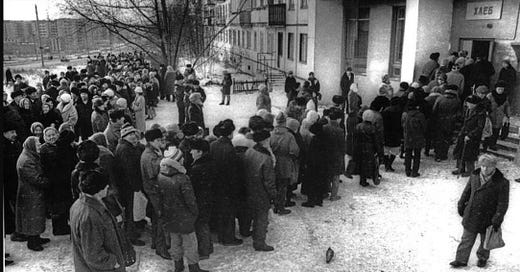Capitalism Or Communism And Why?
Without discussing the aspect of personal freedom, which of these systems delivers for ordinary people? Below is a photograph from Soviet Russia, 1985, a somewhat lengthy queue of shoppers. Did you ever see scenes like that in the United States? Possibly, when people are queuing up to buy the latest Apple phone release, but for essentials, bread, milk?
We see such shortages wherever communism rears its ugly head, and there are very simple reasons for this. The pricing of goods isn’t something that is done for the sake of it. The price mechanism signals to the market. When there is a free or relatively free market, these signals operate effectively. Capitalism is a demand economy; when people are willing to pay more for their goods, prices rise and this stimulates production. This can eventually lead to a drop in prices, which is good for the consumer. More manufacturers/producers enter the market, and the consumer has a wider choice. Consumers spending more money also stimulates investment. An astounding example is computing.
Take a look at advertisements for computers in old magazines at the Internet Archive and sundry on-line historical newspapers. You will be astounded at how expensive they were relative to the cost of living, and how little the purchaser got for his money in the way of power. For example, in 1990, a 200Mb hard disk was considered massive. Yes, 200Mb. Today, mere memory sticks hold a hundred times plus the same data.
In other fields, mass produced clothing has become so cheap that if you lose a couple of buttons on a shirt and can’t sew them on yourself, you’re better off buying a new one than having them sown on at a local shop, a dry cleaner or whoever offers such a service, if any shops still do.
Contrast this with a demand economy. Imagine if instead of the housewife deciding what brand of which product she wanted to buy, this choice was made by Angela Rayner, or Alexandria Ocasio-Cortez. One person or even a committee decides what is to be grown, manufactured or produced, and how much of it. How do you think that would work out? Where are the market signals, who knows how much to invest and in which products the state is to invest?
Communism isn’t a total loss, there are some things it can get right, but only at the cost of others.
Clearly capitalism is better, but wait, there is still a problem. Under communism, there is a shortage of goods and services while under capitalism there is only ever a shortage of money, or more specifically, purchasing power. The shops are typically full of goods, but people - the right people - do not have the wherewithal to purchase them. This is a problem of finance, not of capitalism, and one that will be discussed in a future article.



